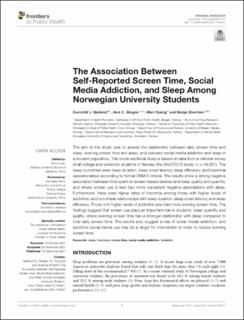The Association Between Self-Reported Screen Time, Social Media Addiction, and Sleep Among Norwegian University Students
Peer reviewed, Journal article
Published version

Åpne
Permanent lenke
https://hdl.handle.net/11250/2837890Utgivelsesdato
2021Metadata
Vis full innførselSamlinger
- Institutt for psykisk helse [1310]
- Publikasjoner fra CRIStin - NTNU [38576]
Sammendrag
The aim of this study was to assess the relationship between daily screen time and sleep, evening screen time and sleep, and between social media addiction and sleep in a student population. This cross-sectional study is based on data from a national survey of all college and university students in Norway (the SHoT2018 study; n = 49,051). The sleep outcomes were sleep duration, sleep onset latency, sleep efficiency, and insomnia operationalized according to formal DSM-5 criteria. The results show a strong negative association between time spent on screen-based devices and sleep quality and quantity, and where screen use in bed had more consistent negative associations with sleep. Furthermore, there were higher rates of insomnia among those with higher levels of addiction, and curvilinear relationships with sleep duration, sleep onset latency, and sleep efficiency. Those with higher levels of addiction also had more evening screen time. The findings suggest that screen use plays an important role in students' sleep quantity and quality, where evening screen time has a stronger relationship with sleep compared to total daily screen time. The results also suggest a role of social media addiction, and addictive social media use may be a target for intervention in order to reduce evening screen time.
